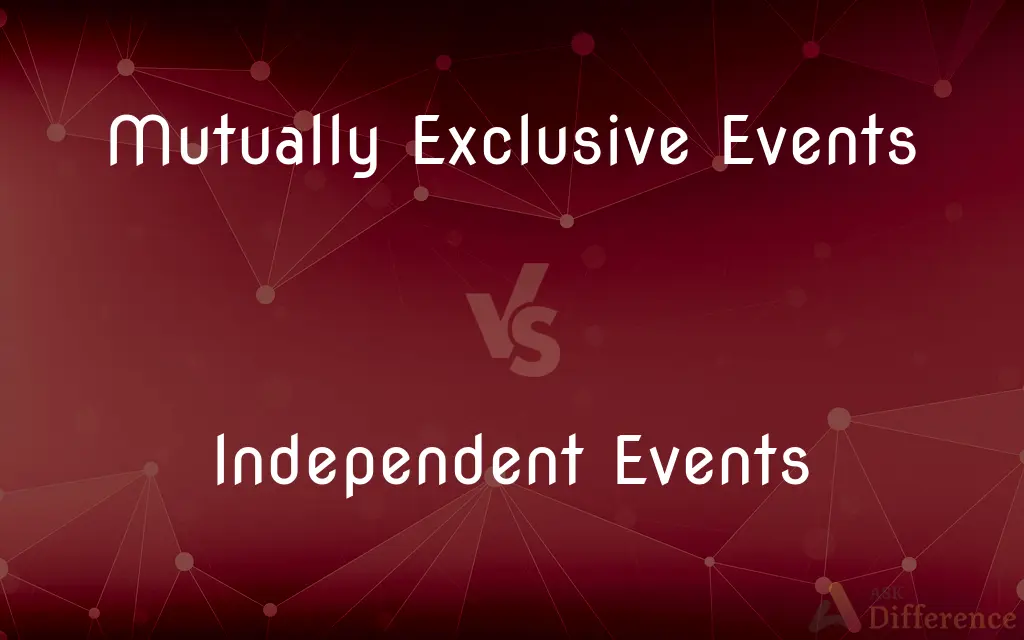Mutually Exclusive Events vs. Independent Events — What's the Difference?
By Tayyaba Rehman — Published on December 3, 2023
Mutually Exclusive Events cannot occur at the same time. Independent Events do not affect the likelihood of the other occurring.

Difference Between Mutually Exclusive Events and Independent Events
Table of Contents
ADVERTISEMENT
Key Differences
Mutually Exclusive Events refer to events that cannot both occur at the same time. For instance, if you flip a coin, it cannot land both heads and tails at once. This means the two outcomes, heads and tails, are mutually exclusive. On the other hand, Independent Events are unrelated events, where the occurrence of one does not affect the probability of the occurrence of the other.
Independent Events, in probability and statistics, represent events where one does not influence the other. For example, drawing a card from a deck and then replacing it before drawing a second card showcases two independent events, as the outcome of the first does not affect the second. Conversely, Mutually Exclusive Events stand in contrast, where the occurrence of one event precludes the possibility of the other.
For Mutually Exclusive Events, the probability of both occurring is always zero. If we're talking about a single dice roll, the events "rolling a 3" and "rolling a 4" are mutually exclusive, as both cannot happen simultaneously. Yet, in the case of Independent Events, the occurrence of one does not impact the likelihood of the other; if one draws two cards successively without replacement, the two draws are independent.
To emphasize, Mutually Exclusive Events are about events that can't happen at the same time. You can't both win and lose a single game of rock-paper-scissors. This is different from Independent Events where each event is unaffected by the other. Tossing a coin and rolling a dice at the same time are independent; the coin's outcome doesn't sway the dice's result.
Comparison Chart
Definition
Cannot occur simultaneously
One doesn't affect the other's occurrence
ADVERTISEMENT
Probability
Probability of both is zero
Product of their individual probabilities
Example
Landing heads or tails on a coin flip
Rolling a dice after a coin toss
Relationship
One happening prevents the other
No relation between occurrences
Overlap
Never overlap in outcomes
Can have overlapping outcomes
Compare with Definitions
Mutually Exclusive Events
Scenarios that are exclusive in nature.
Turning left or right at a junction are Mutually Exclusive Events.
Independent Events
Scenarios where happenings are unrelated.
The stock market's performance and your breakfast choice are Independent Events.
Mutually Exclusive Events
Events with no shared outcomes.
Winning and losing a match are Mutually Exclusive Events.
Independent Events
Separate events with no direct causation.
Temperature in New York and a dice roll in London are Independent Events.
Mutually Exclusive Events
Non-overlapping occurrences in probability.
Drawing a heart or a diamond from a deck in one draw are Mutually Exclusive Events.
Independent Events
Events where one doesn't influence the occurrence of the other.
Drawing a card and rolling a dice are Independent Events.
Mutually Exclusive Events
Outcomes that are not simultaneous.
Being both present and absent in a class are Mutually Exclusive Events.
Independent Events
Unrelated outcomes in a probabilistic setting.
Choosing a marble from a bag and spinning a wheel are Independent Events.
Mutually Exclusive Events
Events that cannot both occur at the same time.
Flipping a coin to get heads or tails are Mutually Exclusive Events.
Independent Events
Events with outcomes unaffected by each other.
Tossing a coin after jumping is an example of Independent Events.
Common Curiosities
Is flipping a coin twice an example of Independent Events?
Yes, the result of the first flip doesn't affect the second.
What are Mutually Exclusive Events?
Events that cannot occur at the same time.
Are getting an odd or even number on a dice roll Mutually Exclusive Events?
Yes, a single roll cannot result in both an odd and even number.
How is the probability of Mutually Exclusive Events determined?
Add their individual probabilities, as they can't occur simultaneously.
Is choosing a dessert from a menu an example of Mutually Exclusive Events?
Yes, if you can only choose one dessert at a time.
Can Mutually Exclusive Events be independent?
No, because if one happens, the other cannot, affecting the other's probability.
If two events are Independent, can they also be mutually exclusive?
No, as mutual exclusivity affects the other's probability, making them dependent.
Can Independent Events have overlapping outcomes?
Yes, they can, as they are events unrelated to each other.
Can drawing two cards in sequence be considered Independent Events?
Only if the first card is replaced before drawing the second.
How are Independent Events defined?
Events where the occurrence of one doesn't influence the occurrence of the other.
How can one tell if events are independent in an experiment?
If the occurrence of one event doesn't alter the probability of the other, they are independent.
Are sunrise and sunset examples of Mutually Exclusive Events?
Yes, as both cannot occur at the exact same moment.
How do you calculate the probability of two Independent Events both occurring?
Multiply their individual probabilities together.
Why can't Mutually Exclusive Events be independent?
Because the occurrence of one directly impacts the probability of the other.
What's a common misconception between Mutually Exclusive Events and Independent Events?
That they can both apply to the same set of events, when in fact, they can't.
Share Your Discovery

Previous Comparison
Electrochemical Cell vs. Electrolytic Cell
Next Comparison
CCTV vs. Surveillance CameraAuthor Spotlight
Written by
Tayyaba RehmanTayyaba Rehman is a distinguished writer, currently serving as a primary contributor to askdifference.com. As a researcher in semantics and etymology, Tayyaba's passion for the complexity of languages and their distinctions has found a perfect home on the platform. Tayyaba delves into the intricacies of language, distinguishing between commonly confused words and phrases, thereby providing clarity for readers worldwide.













































